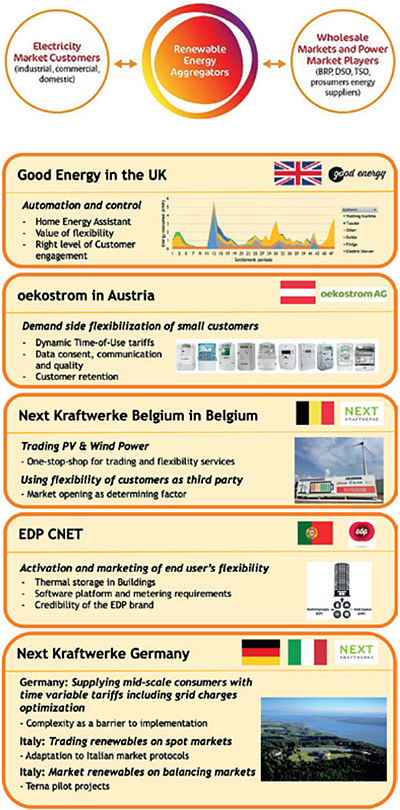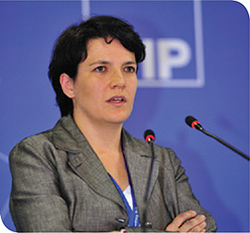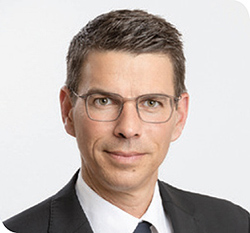"Closing the gap"

Aggregators should be intermediaries to put "Consumers at the heart of the Energy Union". The regulations in the "Clean Energy for all Europeans" Package envisage a situation in long term prospective where the consumers and prosumers are more integrated in the energy market.
Currently, aggregators are mostly acting for industrial and commercial consumers. Domestic consumers, and prosumers, do not have means to trade directly in the energy markets and require the services of an aggregator. Aggregators are the enablers for an active participation of prosumers and consumers in the energy markets
In that context, the European project BestRES "Best practices and implementation of innovative business models for renewable energy aggregators" made real the implementation of business models for aggregators of decentralized renewable energy units acting to support the participation of prosumers and consumers in the energy markets.
Established in 2016 and funded by the European Commission, the BestRES project involved eleven European partners across nine different European Countries: United Kingdom, Belgium, Germany, France, Austria, Italy, Cyprus, Spain and Portugal. The main target group, the aggregators, were involved directly in the project as partners: Good Energy from UK, Next Kraftwerke Germany (targeting Germany, Italy and France), Next Kraftwerke Belgium targeting Belgium, oekostrom from Austria and EDP (targeting Spain and Portugal).
The Consortium included renewable energy experts 3E from Belgium and the Technical University of Vienna from Austria, as legal expert the Foundation for Environmental Energy Law - Stiftung Umweltenergierecht (SUER) from Germany, one dissemination-communication expert, youris.com from Belgium, and a research centre: FOSS from Cyprus. The project was coordinated by WIP – Renewable Energies, based in Munich, Germany.
In the last three years, four fundamental steps have been achieved with the aim to guarantee the implementation of the business models for aggregators of decentralized renewable energy systems and an active participation of prosumers and consumers in the energy markets:
- Analysis of the existing business models
- Improvement of business models and testing phase
- Implementation of business models in real-life conditions
- Identification of National and European enabling
conditions for the uptake of business models for the
aggregation of decentralized renewable energy systems
Thirteen business models have been analyzed and improved during the BestRES project. The analysis focused on technical, market, environmental and social benefits that aggregators bring to power markets and systems. The technical, regulatory, and legal barriers preventing optimal deployment of current business models have also been defined. The business models were tested to define the feasibility for the real-life implementation. Eight of them passed the test and have been implemented under real life conditions with consumers and prosumers from several European Member States.
 Silvia Caneva, the project coordinator from WIP, said:
Silvia Caneva, the project coordinator from WIP, said:
"The BestRES project is the proof that aggregators of decentralized renewable energy units can close the gap for an active participation of consumers and prosumers in the energy markets. Aggregators define a new era for renewable energy sources, since they make possible the access to new markets and services otherwise not accessible for decentralized renewable energy units. She highlighted that flexibility is the key to ensure the adaptation of the energy system to the rise of intermittent generation, decentralized power production and the regionalization of the electricity sector."
 Elias De Keyser, energy & flexibility expert at Next Kraftwerke, said:
Elias De Keyser, energy & flexibility expert at Next Kraftwerke, said:
"The key technology to ensure the provision of flexibility through decentralized renewable energy units is the virtual power plant (VPP), which is defined as technology platform that connects distributed energy resources to markets and services which they might otherwise not have access to (Reference: Bloomberg New Energy Finance). VPPs are the enablers since they cluster decentralized renewable energy units and automatically dispatch the generated renewable electricity".
 Fabian Pause, legal expert from the Foundation for Environmental Energy Law (SUER), said:
Fabian Pause, legal expert from the Foundation for Environmental Energy Law (SUER), said:
"The recently agreed Clean Energy Package with its new rules on market design and renewable energies recognizes that aggregators are important enablers for consumers and prosumers in the future. Aggregation is now clearly described as a function taken by a person that combines multiple customer loads or generated electricity for sale, for purchase or auction in any electricity market. To support this role, the development of a clear legal framework for decentralized market players like consumers and prosumers, both on EU and national level, is crucial."
The project results are available at the BestRES project webpage: www.bestres.eu
For further information please contact:
Silvia Caneva (WIP – Renewable Energies) : silvia.caneva@wip-munich.de
Fabian Pause (SUER) - pause@stiftung-umweltenergierecht.de
Elias De Keyser (Next Kraftwerke) - DeKeyser@next-kraftwerke.be
The BestRES project has received funding from the European Union's Horizon 2020 research and innovation programme under grant agreement No. 691689. The sole responsibility for the content of this publication lies with the authors. It does not necessarily reflect the opinion of the European Commission. The European Commission is not responsible for any use that may be made of the information contained therein.